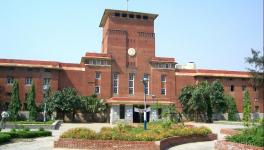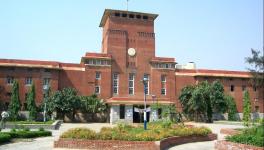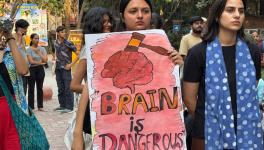EWS Expansion: Uncertainty Ahead of 4,500 Ad-hoc Teachers at DU
Thousands of ad-hoc teachers at the Delhi University are staring at an uncertain future with no clarity on jobs from the upcoming academic session beginning next week. The uncertainty set in soon after the Ministry of Human Resources Development made it clear that reservation for economically weaker sections (EWS) will be implemented from the current session itself. In the wake of EWS expansion, Delhi University increased the present strength of seats by 25% at the Delhi University to ensure that students from unreserved categories remain unaffected. However, the teachers are still awaiting clear instructions from the university administration. Experts maintain that the precarious situation at the university will only deepen the crisis.
Talking to NewsClick, Rajib Ray, president, Delhi University Teachers’ Association (DUTA) said that the expansion should not come at the cost of common teachers. He said, "Over 4,500 teachers in Delhi University are working on ad-hoc basis. These teachers have been denied the chance of becoming permanent as interviews were held sparsely and sporadically over the last 10 years. As the EWS reservation is going to decrease, teaching posts towards UR candidates (especially as the university and colleges have not been sanctioned additional teaching posts as of now), the displaced teachers will face hardships and uncertainty despite their best contribution.
He added, "As a public-funded central university, DU caters to a very heterogeneous group of students. Thousands of students approach Delhi University only to seek quality education. But with present set of issues, it would be very difficult to impart quality education. Despite several reminders to the UGC and the MHRD, the OBC expansion (implemented in 2007) has remained incomplete. Most DU Colleges have not received final sanction for the second tranche of the promised teaching posts. Neither have colleges received any additional posts as required for the proper implementation of the Choice Based Credit System (implemented in 2015). Now, absence of clarity on engagement of ad-hoc teachers will only further the problem."
To the question of allocation of funds by University Grants Commission towards the implementation of EWS quota, he said, "The Government of India/ MHRD (as per the UGC letter of 10.06.2019) has allocated an additional amount of Rs 143.76 crore to the University (under OH-36 Salary) and Rs 47.24 crore for constituent/affiliated colleges towards increase in teaching and non-teaching staff for the implementation of the EWS expansion, but the letter also stipulates that the money allocated to the University and colleges infrastructural needs have to be sought from Higher Education Finance Agency. On the one hand, you want higher education accessible to all, and on other hand, you also want them to bear the huge costs. Over 60% of students come from socio-economically weaker backgrounds and pushing the burden of expansion on shoulders of parents and students is not justified and can be only viewed as commercialisation of public-funded higher education. We demand for a 100% grant-based funding towards maintenance and expansion."
Echoing similar sentiments, Abha Dev Habib, former Executive Council member, said, “Central and state government should take responsibility of the EWS expansion. The University is going to open in a week's time. There is a panic, as 10% of working ad-hoc teachers are going to be displaced because of the EWS reservation in teaching cadre. EWS reservation should be implemented only after creation of new posts on the count of this expansion and all working ad-hoc teachers should be given rejoining. Hope MHRD and Delhi Government will put their act together."
Also read: EWS Quota in Delhi University: A Not-so-Smooth Road Ahead
Get the latest reports & analysis with people's perspective on Protests, movements & deep analytical videos, discussions of the current affairs in your Telegram app. Subscribe to NewsClick's Telegram channel & get Real-Time updates on stories, as they get published on our website.
























